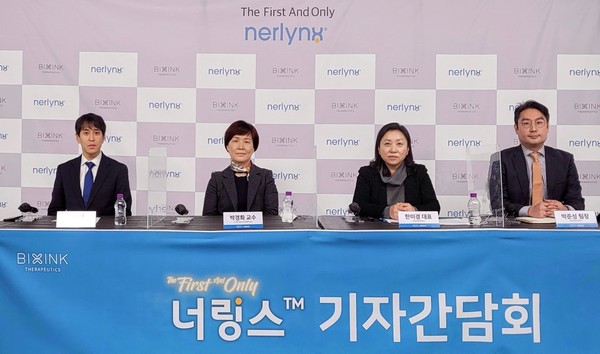“Until now, there was no way to prevent recurrence of breast cancer in high-risk HER2 early breast cancer patients who completed adjuvant antibody treatment. As there is no treatment to prevent brain metastasis, the market release of Nerlynx (ingredient: neratinib) could satisfy the unmet demand of Korean patients.”
So said professor Park Kyong-hwa of hemato-oncology at Korea University Anam Hospital during her presentation on the latest treatment of HER2 positive early breast cancer and Nerlynx’s clinical usefulness at an online news conference held by Bixink Therapeutics.

Nerlynx is an oral HER2 positive breast cancer drug developed by Puma Biotechnology, a U.S.-based biopharmaceutical firm. The treatment obtained FDA approval as the extended adjuvant treatment in 2017. Then, the indication was broadened to treat metastatic HER2-positive breast cancer in 2020.
In Korea, Bixink Therapeutics licensed in Nerlynx and obtained approval from the Ministry of Food and Drug Safety in October last year.
The drug is indicated as the extended adjuvant therapy for patients with HER2 receptor-positive and hormone receptor-positive early breast cancer who are within one year of completion of trastuzumab-based adjuvant therapy after surgery. A patient can take six pills of Nerlynx once daily.
Bixink Therapeutics emphasized that Nerlynx is the nation’s first and only extended adjuvant therapy for HER2 positive early breast cancer.
Park explained that the ultimate goal of treating HER2-positive early breast cancer was to prevent relapse and extend the patient’s survival and that Nerlynx would satisfy such unmet needs.
“In Korea, the number of early breast cancer patients keeps rising. Compared to 20 years ago, the number is almost triple now,” Park said.
As breast cancer can be screened easily in Korea, many patients get treatment early. However, the disease comes back often, she went on to say.
Even when there is no residual cancer after prior chemotherapy, 20 percent of patients experience relapse within five years, Park said. Existing targeted therapy and hormone-blocking treatment aim to prevent recurrence and prolong the patient's life.
Park emphasized that it was important to prevent brain metastasis, particularly to prevent breast cancer relapse. However, earlier clinical trials showed that targeted antibody treatments such as Herceptin (trastuzumab)+Perjeta (pertuzumab) and Kadcyla (T-DM1) were not effective in preventing brain metastasis in early breast cancer patients, she said.
In contrast, the phase 3 ExteNET trial of Nerlynx showed that the adjuvant Nerlynx therapy added to Herceptin reduced the risk of recurrence by 43 percent in HER2 positive early breast cancer after surgery, Park said.
Nerlynx has a smaller molecular size than existing monoclonal antibody drugs, making it easier to pass through the blood-brain barrier, she added.
Citing the latest Korean treatment recommendation for breast cancer, Park said patients would receive Herceptin and Perjeta as chemotherapy for a year after surgery. After that, they can consider using Nerlynx additionally for another year.
The most common adverse reaction of Nerlynx was diarrhea in the phase 3 study. It occurred in about 40 percent of the patients.
Park has used an expanded-access program (EAP) to administer Nerlynx to Korean patients. “Prescribing antidiarrheal agent loperamide before using Nerlynx helped patients adjust their symptoms without difficulty,” she said.
Despite the clinical efficacy of Nerlynx, Bixink Therapeutics is facing another challenge. The supply price of 7 million won ($5,881) for 180 tablets per month is expected to be a heavy burden on patients. However, at the news conference, Bixink said Nerlynx could become reimbursable in 2023.
Park Joon-sung, marketing manager at Bixink, said the company submitted a drug pricing application to the government and was waiting for a reply. He hoped that the company could provide the drug for early breast cancer patients at an appropriate price.
Han Mi-kyeong, CEO of Bixink Therapeutics, said the company entered the biotech market when KPS acquired it in 2019.
As the company is a newcomer, it does not have its R&D or manufacturing facilities. Still, Bixink plans to build local manufacturing facilities, and the company is considering an M&A to do so, she said.

